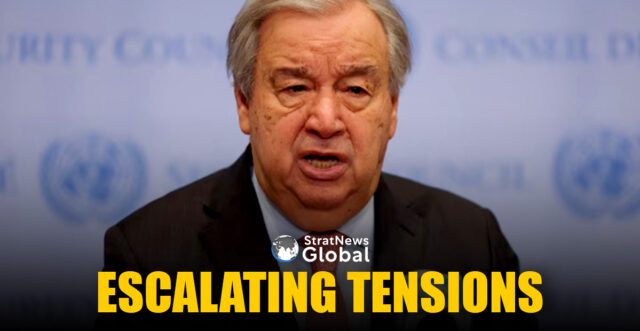United Nations (UN) Secretary-General António Guterres on Monday urged India and Pakistan to exercise “maximum restraint,” cautioning that rising tensions following a recent deadly terror attack in Jammu and Kashmir could escalate into a full-scale military conflict.
Addressing journalists outside the Security Council at UN Headquarters in New York, Guterres expressed deep concern over deteriorating relations between the two South Asian neighbours, saying they had reached “their highest in years.”
He reiterated his condemnation of the April 22 terror attack in the Pahalgam area of Jammu and Kashmir, which killed at least 26 civilians and injured many more.
“Targeting civilians is unacceptable – and those responsible must be brought to justice through credible and lawful means,” Guterres said.
“It is also essential – especially at this critical hour – to avoid a military confrontation that could easily spin out of control,” he said.
UN Ready To Help De-Escalate
Guterres offered his good offices to both governments to help defuse tensions and promote diplomacy, stressing that “a military solution is no solution.”
“Now is the time for maximum restraint and stepping back from the brink,” he said.
Guterres also praised both countries for their long-standing contributions to UN peacekeeping operations and expressed hope that their shared history of cooperation could form the basis for renewed dialogue.
“The United Nations stands ready to support any initiative that promotes de-escalation, diplomacy, and a renewed commitment to peace,” he said.
Security Mock Drills
The Indian government has asked all states to conduct security mock drills on Wednesday (May 7) for “effective civil defence in the event of a hostile attack” amid tensions between India and Pakistan in the wake of the April 22 Pahalgam terror attack, media reports said.
The timing of the Centre’s order is crucial. The last such drill was conducted in 1971, the year in which India and Pakistan went to war.
The Ministry of Home Affairs (MHA) has asked states to operationalise air raid warning sirens and train civilians to protect themselves in the event of a hostile attack.
States have been directed to implement emergency blackout measures and ensure early camouflage of critical plants and installations.
(With inputs from IBNS)





